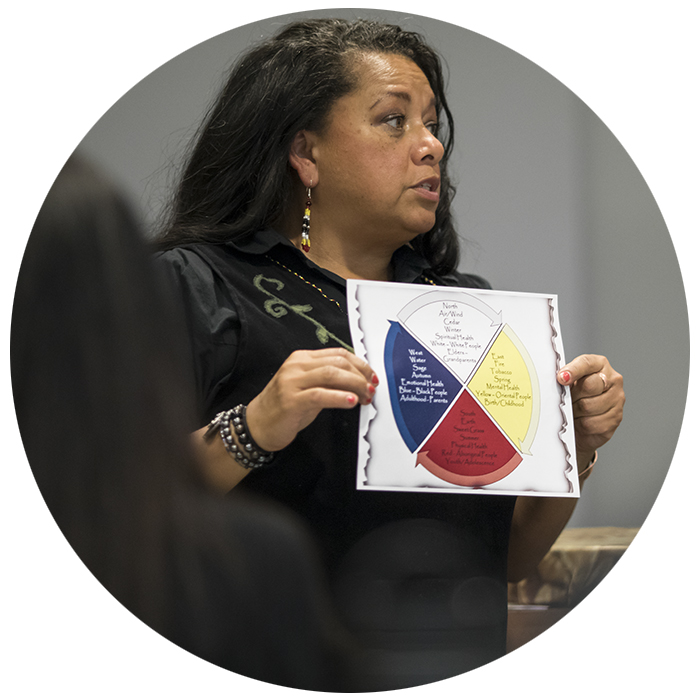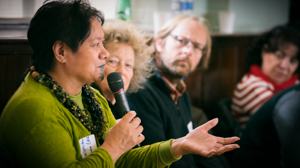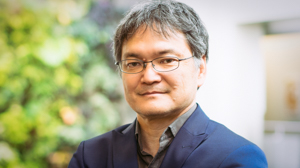- Future Students
- Current Students
- Faculty
- Staff
- Alumni
- Others
Indigenous cultural expert brings ancient Medicine Wheel teachings to UofGH

Sacred beliefs and teachings, which frame culture and identity — passed on from one generation to another — are an integral part of all Indigenous Peoples across Canada.
Several students and faculty members from the University of Guelph-Humber participated in traditional teachings as part of an on-campus event recently organized by Student Life.
Kim Wheatley, Senior Manager of Culture & Community Outreach for the Aboriginal Sport & Wellness Council of Ontario (ASWCO), introduced the basic parts of the Medicine Wheel in an interactive workshop inviting the participants to recreate the revered symbol based on their own interpretation.
What is a Medicine Wheel?
According to Indigenous teachings, the Medicine Wheel is a key symbol of peaceful interaction and represents all of creation, harmony and connections. The four quarters of the Medicine Wheel represent the four directions, the four elements of life, four seasons, and four stages of life, and more.
The Medicine Wheel is a fluid concept because people can decode it in more than one way, Wheatley pointed out.
“Today, you all experienced what it means to translate an Indigenous concept in a foreign environment and foreign language (English),” Wheatley remarked, adding that sometimes the main essence of Indigenous wisdom can become lost in translation, especially when it is interpreted in another language, or by people unfamiliar with the culture.
“I hope you have learned how the principles of the Medicine Wheel can be incorporated into your lives and how it is indeed a universal tool.”
Warren Schlote, a fourth-year Media Studies student who participated in the workshop, said that even though he was somewhat aware of the concept, he did not realize its real significance. The workshop gave him lot to think about, he said.
“Modern life is busy and a lot of people feel ungrounded or lost for a variety of reasons,” said Schlote. “The Medicine Wheel teaches us about balance and the cyclical nature of life. It can be used as a tool to keep things in perspective.”
The 2018 Masters’ Indigenous Games
The primary focus of the workshop was to show the connection between the body, mind, emotions and spirit – important elements that will be the forefront theme during the upcoming 2018 Masters’ Indigenous Games. Students and faculty from UofGH are set to volunteer at the games.
The Masters’ Games takes place on July 12-15 at Downsview Park, and will feature more than 2,000 participants.
“The main objective of the games is to provide Indigenous adults aged 20 years and older with the opportunity to take part and compete in several contemporary and traditional sporting activities such as hockey, soccer, athletics, tug-of-war, archery, teepee building and more,” Wheatley noted.
“The event will also host a cultural village, featuring Indigenous art, performances, and sport demonstrations, which will all provide an excellent way for all attendees to learn about and celebrate Indigenous cultures from around the world.”







